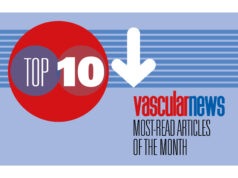 Alucent Biomedical announced in a press release that it has enrolled the first patient in ACTIVATE II, an Australia-based first-in-human clinical trial to evaluate the safety and efficacy of its natural vascular scaffolding (AlucentNVS) technology. The therapy is designed to open vessels and maintain patency without the use of permanent implants for the treatment of peripheral artery disease (PAD) of the lower extremities.
Alucent Biomedical announced in a press release that it has enrolled the first patient in ACTIVATE II, an Australia-based first-in-human clinical trial to evaluate the safety and efficacy of its natural vascular scaffolding (AlucentNVS) technology. The therapy is designed to open vessels and maintain patency without the use of permanent implants for the treatment of peripheral artery disease (PAD) of the lower extremities.
The AlucentNVS vessel restoration system with photoactivated linking combines standard angioplasty with linking of the structural proteins in the wall of a blood vessel. The intervention is designed to deliver restoration of the vessel’s lumen and sustained improvement of blood flow, without the introduction of a foreign implant, such as a metallic stent. AlucentNVS photoactivated linking is also designed to mitigate the well-known adverse effects of angioplasty, such as vessel recoil. Sustained, improved blood flow is expected to result in pain relief, limb preservation, and an improved quality of life for patients.
The first patient in the ACTIVATE II study was enrolled by Chris Delaney at Flinders Medical Centre in Adelaide, Australia. In total, the trial will enrol up to 50 subjects at up to 12 research sites, which will include Prince of Wales Hospital in Sydney, The Alfred Hospital in Melbourne, Royal Perth Hospital, and Sir Charles Gairdner Hospital in Perth. The primary endpoints of the study are freedom from composite investigational-device, procedure-related major adverse events, primary patency as assessed by Doppler ultrasound, and freedom from clinically driven target lesion revascularisation (CD-TLR) at one year.
ACTIVATE II follows the completion of enrolment for ACTIVATE I safety study of AlucentNVS in the USA. Pre-clinical testing of AlucentNVS in animal studies has shown acute and long-term safety and patency without the pro-inflammatory and mechanical risks of placing a rigid foreign implant into the blood vessel.
“PAD is a difficult condition affecting so many people worldwide, and its current treatments have significant shortcomings,” said Myles Greenberg, Alucent Biomedical’s CEO. “We want to change that by offering a whole new way to treat these patients with AlucentNVS. Alucent’s novel approach has the potential to change the way PAD is managed in the future.”













